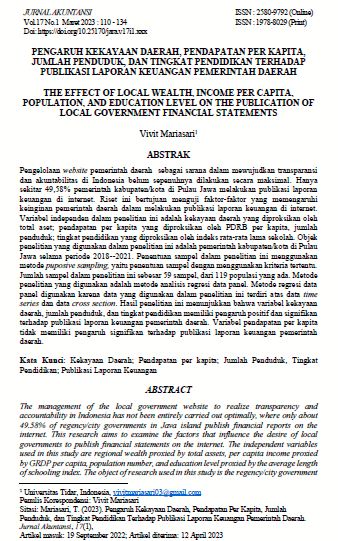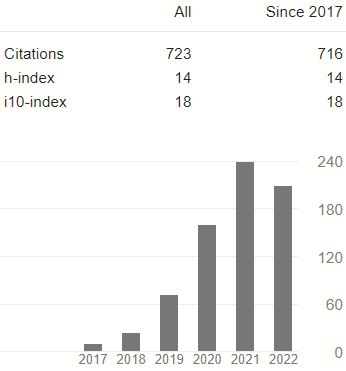PENGARUH KEKAYAAN DAERAH, PENDAPATAN PER KAPITA, JUMLAH PENDUDUK, DAN TINGKAT PENDIDIKAN TERHADAP PUBLIKASI LAPORAN KEUANGAN PEMERINTAH DAERAH
DOI:
https://doi.org/10.25170/jak.v17i1.3728Keywords:
Kekayaan Daerah, Pendapatan per kapita, Jumlah Penduduk, Tingkat Pendidikan, Publikasi Laporan KeuanganAbstract
The management of the Local Government website as a means of realizing transparency and accountability in Indonesia has not been fully carried out optimally, where only about 49.58% of regency/city governments in Java island publish financial reports on the internet. This research aims to examine the factors that influence the desire of local governments to publish financial statements on the internet. The independent variables used in this study are Regional Wealth proxied by Total Assets, Per capita Income proxied by GRDP Per capita, Population Number, and Education Level proxied by the average length of schooling index. The object of research used in this study is the Regency/City Government in Java Island during the 2018-2021 period. The determination of samples in this study uses the puposive sampling method, which is the determination of samples using certain criteria. The number of samples in this study was 59 samples, out of 119 existing populations. The research method used in this study is the panel data regression analysis method. The panel data regression method was used because the data used in this study consisted of time series data and cross section data. The results showed that variables of regional wealth, population and level of education had a positive and significant influence on the publication of local government financial statements. Meanwhile, the variable per capita income does not have a significant influence on the publication of local government financial statements.
References
Afryansyah, R. D. (2013). Faktor-Faktor Yang Mempengaruhi Pengungkapan Informasi Akuntansi Di Internet Oleh Pemerintah Daerah. Diponegoro Journal of Accounting, 0(0), 702–712.
Andriani, Y. (2015). Analisis Pengaruh Kompetisi Politik, Tingkat Pendidikan dan Jumlah Penduduk Terhadap Tingkat Pengungkapan Informasi Non Keuangan dalam Website Pemerintah Daerah Kabupaten dan Kota di Sumatera. Universitas Negeri Padang, 2(5), 255.
BPS. (n.d.-a). Indeks Lama Sekolah. Retrieved from https://sirusa.bps.go.id/sirusa/index.php/indikator/572
BPS. (n.d.-b). Perhitungan PDRB per kapita. Retrieved from https://sirusa.bps.go.id/sirusa/index.php/indikator/74
Candrarin, G. (2018). Metode Riset Akuntansi Pendekatan Kuantitatif. Jakrta: Salemba Empat.
Dewi, V. I., & Adi, P. H. (2019). Pengaruh Tingkat Pendidikan, Jumlah Penduduk, dan Opini Audit Terhadap Transparasi Informasi Keuangan Pemerintah Daerah. International Journal of Social Science and Business, 3(4), 358. https://doi.org/10.23887/ijssb.v3i4.21322
Diptyana, P., & Rokhmania, N. (2018). Exploring government internet financial reporting in Indonesia. Jurnal Ekonomi Dan Bisnis, 21(1), 115–138. https://doi.org/10.24914/jeb.v21i1.1039
García, A. C., & García-García, J. (2010). Determinants of online reporting of accounting information by Spanish local government authorities. Local Government Studies, 36(5), 679–695. https://doi.org/10.1080/03003930.2010.506980
Godfrey, Jayne; Hodgson, Allan; Tarca, Ann; Hamilton, Jane; Holmes, S. (2010). Accounting Theory (7th ed.). Godfrey, Jayne; Hodgson, Allan; Tarca, Ann; Hamilton, Jane; Holmes, Scott.
Guillamón, M. D., Ríos, A. M., Gesuele, B., & Metallo, C. (2016). Factors influencing social media use in local governments: The case of Italy and Spain. Government Information Quarterly, 33(3), 460–471. https://doi.org/10.1016/j.giq.2016.06.005
Hoesada, J. (2019). BEDAH IPSAS 22 PENGUNGKAPAN INFORMASI KEUANGAN SEKTOR PEMERINTAHAN UMUM.
Kawatu, F. S. (2019). Analisis Laporan Keuangan Sektor Publik. Yogyakarta: Penerbit Deepublis.
Krina, L. L. (2003). Indikator & Alat Ukur Prinsip Akuntabilitas, Transparansi & Partisipasi. Sekretariat Good Public Governance BPPN, 1–25.
Masra, E. A., & Sari, V. F. (2020). Faktor Yang Mempengaruhi Internet Financial Reporting (Ifr) Pada Pemerintah Kabupaten/Kota Di Sumatera Barat. Jurnal Eksplorasi Akuntansi, 2(2), 2757–2771. https://doi.org/10.24036/jea.v2i2.246
Muslich Anshori, S. I. (2019). Metodologi Penelitian Kuantitatif: Edisi 1. Airlangga University Press.
Peraturan Pemerintah No 71 Tahun 2010. (2016). Standar Akuntansi Pemerintahan Republik Indonesia. Standar Akuntansi Pemerintahan, 1–269.
Pratama, K. A. D., Werastuti, D. N. S., & Sujana, E. (2015). Pengaruh Kompleksitas Pemerintah Daerah, Ukuran Pemerintah Daerah, Kekayaan Daerah, Dan Belanja Daerah Terhadap Pelaporan Keuangan Pemerintah Daerah (Studi pada Pemerintah Kabupaten/Kota di Bali Tahun 2010-2013). E-Journal S1 Ak Universitas Pendidikan Ganesha Jurusan Akuntansi Program S1, 3(1), 12.
Presiden Republik Indonesia. (2003). INSTRUKSI PRESIDEN REPUBLIK INDONESIA NOMOR 3 TAHUN 2003 TENTANG KEBIJAKAN DAN STRATEGI NASIONAL PENGEMBANGAN E-GOVERNMENT PRESIDEN. Atmospheric Environment, 38(5), 3395–3404. Retrieved from http://dx.doi.org/10.1016/j.buildenv.2015.02.015
Saraswati, T., Budiarti, L., & Sudibyo, Y. A. (2019). Publikasi Laporan Keuangan pemerintah Daerah di Internet dan Faktor yang Memengaruhi. Reviu Akutansi Dan Bisnis Indonesia, 3(1), 85–101.
Styles, A. K., & Tennyson, M. (2007). Journal of Public Budgeting, Accounting & Financial Management Article information. Public Budgeting, Accounting & Financial Management, 19(1), 56–92. Retrieved from https://doi.org/10.1108/JPBAFM-19-01-2007-B003
Wicaksono, D., & Prabowo, A. (2016). Publikasi Laporan Keuangan Pemerintah Daerah (Lkpd114) Melalui Internet (Iflgr) Dan Faktor-Faktor Yang Mempengaruhi. Media Ekonomi, 16(1), 114. https://doi.org/10.30595/medek.v16i1.1278

Downloads
Published
Issue
Section
License
Copyright (c) 2023 Vivit Mariasari

This work is licensed under a Creative Commons Attribution-ShareAlike 4.0 International License.
Authors who publish with this journal agree to the following terms:
- Authors retain copyright and grant the journal right of first publication with the work simultaneously licensed under a Creative Commons Attribution-ShareAlike 4.0 International License that allows others to share the work with an acknowledgment of the work's authorship and initial publication in this journal.
- Authors are able to enter into separate, additional contractual arrangements for the non-exclusive distribution of the journal's published version of the work (e.g., post it to an institutional repository or publish it in a book), with an acknowledgment of its initial publication in this journal.
- Authors are permitted and encouraged to post their work online (e.g., in institutional repositories or on their website) prior to and during the submission process, as it can lead to productive exchanges, as well as earlier and greater citation of published work.














